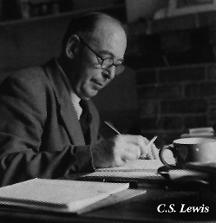
Hidden Theology
In his first installment of the space trilogy, Lewis includes several themes that are common to much of his fiction and non-fiction alike. Theology, which has always been important in Lewis’s writing, appears in subtle and progressive forms in Out of the Silent Planet. A reader unfamiliar with the context of much of Lewis’s writing might not realize the religious undertones until nearly half way through the story, when Ransom deliberates in his mind whether he should attempt to evangelize to the supposedly religiously ignorant Hrossa. He soon discovers, however, that the Hrossa have a strong and complex religious understanding that does not necessarily conflict with his own. In fact, Hnohra even tries to instruct Ransom, feeling that he has little sense of theology. After the ice is broken with this mention of religion, it is easy to see parallels throughout the text. The Eldila are representative of angels, while Maleldil the young is the Malacandrian Christ or God.
This theme of theology is contrasted with Lewis’s representation of evil throughout the story. The two villains are almost caricatures of evil, with no redeeming qualities. Weston scorns most of the individual members of the species whose advancement he has taken upon himself. His ideals are strong but misguided, creating a driven but corrupt agent of evil. Devine, while more polite and sociable than Weston, is the more despicable of the two. He has no dreams of advancing the human race and is involved in the project for the industrialization of Malacandra only to bring profit for himself. This black and white representation of evil does not, as it would be assumed, bring a triviality and cheapness to the story. The theological theme almost dictates that such stark contrast and dualism must exist. This dualism is also present between the benevolent Malacandrian Eldila and the silent, evil Thulcandrian ones.
The use of the middle-aged scholar Ransom as the cosmic hero is in itself symbolic. Like his friend J. R. R. Tolkien, C. S. Lewis favored stories in which an unlikely hero was called upon to perform great deeds. Lewis’s famous Chronicles of Narnia are full of reluctant or developing heroes who come into their own by the end of the story. So Ransom, as he is put into challenging situations, asserts himself as a worthy hero who will continue to develop as the trilogy moves forward.
